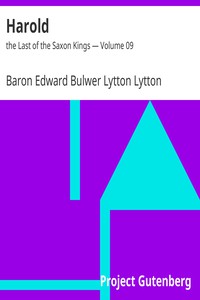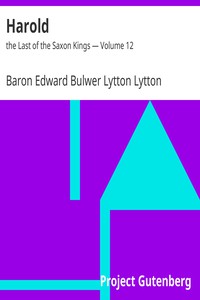Harold : the Last of the Saxon Kings — Complete, Lytton [best e reader for academics .txt] 📗

- Author: Lytton
Book online «Harold : the Last of the Saxon Kings — Complete, Lytton [best e reader for academics .txt] 📗». Author Lytton
Tostig (as we have seen) had married the daughter of Baldwin, Count of Flanders, sister to Matilda, wife to the Norman Duke: and thus the House of Godwin was triply allied to princely lineage—the Danish, the Saxon, the Flemish. And Tostig might have said, as in his heart William the Norman said, “My children shall descend from Charlemagne and Alfred.”
Godwin’s life, though thus outwardly brilliant, was too incessantly passed in public affairs and politic schemes to allow the worldly man much leisure to watch over the nurture and rearing of the bold spirits of his sons. Githa his wife, the Dane, a woman with a haughty but noble spirit, imperfect education, and some of the wild and lawless blood derived from her race of heathen sea-kings, was more fitted to stir their ambition and inflame their fancies, than curb their tempers and mould their hearts.
We have seen the career of Sweyn; but Sweyn was an angel of light compared to his brother Tostig. He who can be penitent has ever something lofty in his original nature; but Tostig was remorseless as the tiger, as treacherous and as fierce. With less intellectual capacities than any of his brothers, he had more personal ambition than all put together. A kind of effeminate vanity, not uncommon with daring natures (for the bravest races and the bravest soldiers are usually the vainest; the desire to shine is as visible in the fop as in the hero), made him restless both for command and notoriety. “May I ever be in the mouths of men,” was his favourite prayer. Like his maternal ancestry, the Danes, he curled his long hair, and went as a bridegroom to the feast of the ravens.
Two only of that house had studied the Humane Letters, which were no longer disregarded by the princes of the Continent; they were the sweet sister, the eldest of the family, fading fast in her loveless home, and Harold.
But Harold’s mind,—in which what we call common sense was carried to genius,—a mind singularly practical and sagacious, like his father’s, cared little for theological learning and priestly legend—for all that poesy of religion in which the Woman was wafted from the sorrows of earth.
Godwin himself was no favourite of the Church, and had seen too much of the abuses of the Saxon priesthood, (perhaps, with few exceptions, the most corrupt and illiterate in all Europe, which is saying much,) to instil into his children that reverence for the spiritual authority which existed abroad; and the enlightenment, which in him was experience in life, was in Harold, betimes, the result of study and reflection. The few books of the classical world then within reach of the student opened to the young Saxon views of human duties and human responsibilities utterly distinct from the unmeaning ceremonials and fleshly mortifications in which even the higher theology of that day placed the elements of virtue. He smiled in scorn when some Dane, whose life had been passed in the alternate drunkenness of wine and of blood, thought he had opened the gates of heaven by bequeathing lands gained by a robber’s sword, to pamper the lazy sloth of some fifty monks. If those monks had presumed to question his own actions, his disdain would have been mixed with simple wonder that men so besotted in ignorance, and who could not construe the Latin of the very prayers they pattered, should presume to be the judges of educated men. It is possible—for his nature was earnest—that a pure and enlightened clergy, that even a clergy, though defective in life, zealous in duty and cultivated in mind,—such a clergy as Alfred sought to found, and as Lanfranc endeavoured (not without some success) to teach—would have bowed his strong sense to that grand and subtle truth which dwells in spiritual authority. But as it was, he stood aloof from the rude superstition of his age, and early in life made himself the arbiter of his own conscience. Reducing his religion to the simplest elements of our creed, he found rather in the books of Heathen authors than in the lives of the saints, his notions of the larger morality which relates to the citizen and the man. The love of country; the sense of justice; fortitude in adverse and temperance in prosperous fortune, became portions of his very mind. Unlike his father, he played no actor’s part in those qualities which had won him the popular heart. He was gentle and affable; above all, he was fair-dealing and just, not because it was politic to seem, but his nature to be, so.
Nevertheless, Harold’s character, beautiful and sublime in many respects as it was, had its strong leaven of human imperfection in that very self-dependence which was born of his reason and his pride. In resting so solely on man’s perceptions of the right, he lost one attribute of the true hero—faith. We do not mean that word in the religious sense alone, but in the more comprehensive. He did not rely on the Celestial Something pervading all nature, never seen, only felt when duly courted, stronger and lovelier than what eye could behold and mere reason could embrace. Believing, it is true, in God, he lost those fine links that unite God to man’s secret heart, and which are woven alike from the simplicity of the child and the wisdom of the poet. To use a modern illustration, his large mind was a “cupola lighted from below.”
His bravery, though inflexible as the fiercest sea-king’s, when need arose for its exercise, was not his prominent characteristic. He despised the brute valour of Tostig,—his bravery was a necessary part of a firm and balanced manhood—the bravery of Hector, not Achilles. Constitutionally averse to bloodshed, he could seem timid where daring only gratified a wanton vanity, or aimed at a selfish object. On the other hand, if duty demanded daring, no danger could deter, no policy warp him;—he could seem rash; he could even seem merciless. In the what ought to be, he understood a must be.
And it was natural to this peculiar, yet thoroughly English temperament, to be, in action, rather steadfast and patient than quick and ready. Placed in perils familiar to him, nothing could exceed his vigour and address; but if taken unawares, and before his judgment could come to his aid, he was liable to be surprised into error. Large minds are rarely quick, unless they have been corrupted into unnatural vigilance by the necessities of suspicion. But a nature more thoroughly unsuspecting, more frank, trustful, and genuinely loyal than that young Earl’s, it was impossible to conceive. All these attributes considered, we have the key to much of Harold’s character and conduct in the later events of his fated and tragic life.
But with this temperament, so manly and simple, we are not to suppose that Harold, while rejecting the superstitions of one class, was so far beyond his time as to reject those of another. No son of fortune, no man placing himself and the world in antagonism, can ever escape from some belief in the Invisible. Caesar could ridicule and profane the mystic rites of Roman mythology, but he must still believe in his fortune, as in a god. And Harold, in his very studies, seeing the freest and boldest minds of antiquity subjected to influences akin to those of his Saxon forefathers, felt less shame in yielding to them, vain as they might be, than in monkish impostures so easily detected. Though hitherto he had rejected all direct appeal to the magic devices of Hilda, the sound of her dark sayings, heard in childhood, still vibrated on his soul as man. Belief in omens, in days lucky or unlucky, in the stars, was universal in every class of the Saxon. Harold had his own fortunate day, the day of his nativity, the 14th of October. All enterprises undertaken on that day had hitherto been successful. He believed in the virtue of that day, as Cromwell believed





Comments (0)